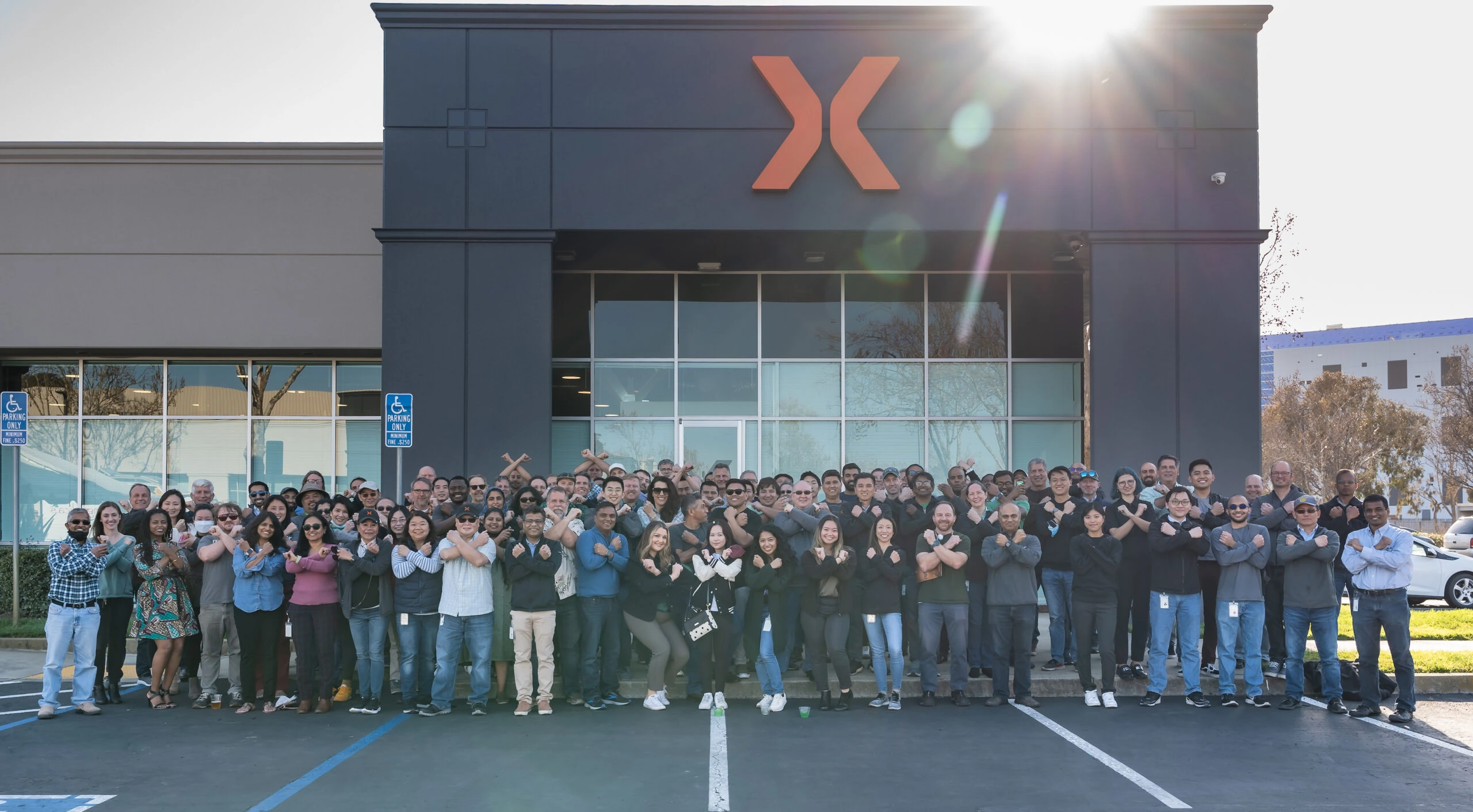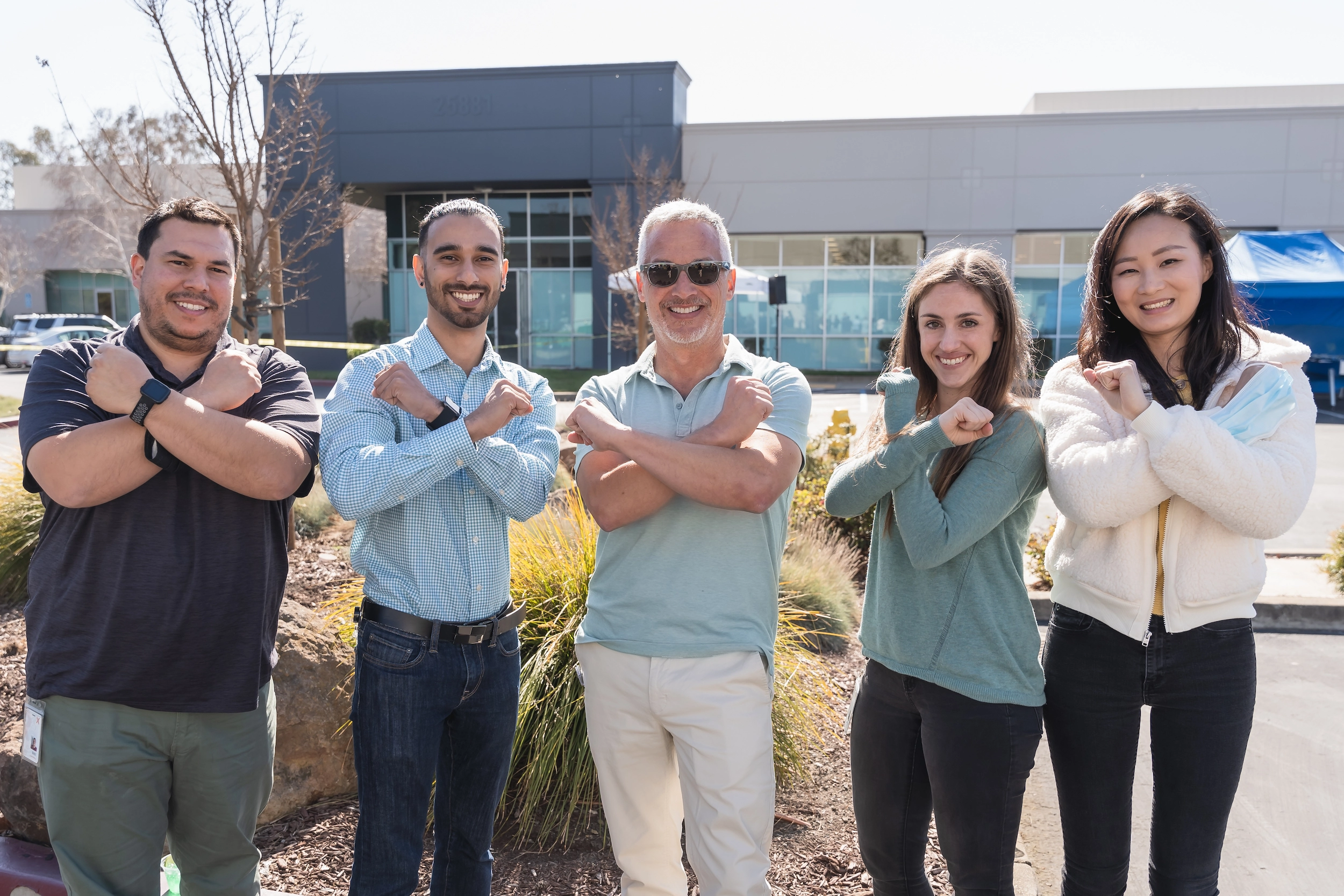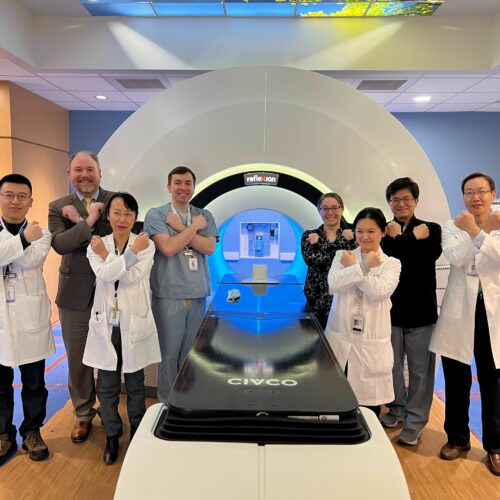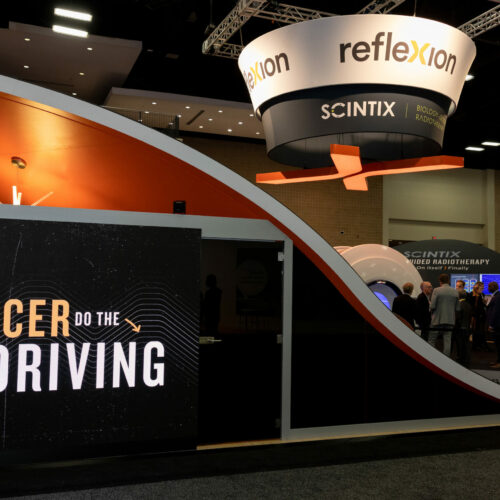
People
The Birth of a Novel Technology and a Unique Culture
July 29, 2022
More than a decade ago, Sam Mazin and his best friend Akshay Nanduri were spending long hours over many months huddled together in Mazin’s apartment trying to figure out if they could build a machine that would treat cancer in a new way. When they realized they might be able to, they founded RefleXion Medical.
For many of RefleXion’s early years, it was just the two co-founders plus some interns. “It was an R&D company at the time because we were essentially trying to build a machine. That was the focus even when we finally got financing to build a team,” says Mazin. “We didn’t really start thinking about culture until much later in the company’s life.”
Since he had spent many years on an academic track—earning his bachelor’s degree from the University of Waterloo, and his master’s degree and Ph.D. from Stanford University—Mazin hadn’t spent much time in the industry. He had experienced large and small company cultures during four-month cooperative work-terms (internships) that were part of his undergraduate studies. “RefleXion was really my first [full-time] job,” he says. Mazin recalls a work-term in a New Hampshire-based R&D satellite of a larger company that had eight full-time employees plus him. “I really enjoyed being part of the startup environment, getting the sense of the team dynamics and feeling like it’s almost a family because it’s such a small group. We would hang out after work,” he says. “Although I had no idea then that I would start a company, that experience certainly impressed upon me the value of teams and the fact that people can do a lot more together than separately.”
RefleXion’s co-founders were very fortunate with their first full-time hires: Peter Olcott and David Larkin. Larkin, senior vice president of engineering and head of R&D, Mazin explains, has experience as an engineer and an executive, and he has built R&D teams. He knows how to reward staff progress without turning everyone into managers. “David had the concept of this dual-track where a technical leader can develop technically and reap the benefits of promotions without being forced into a management position they may not want. That’s a path that Peter Olcott followed,” he says.
“The first people you bring into the company are really important because you’re forming the DNA of the organization, and they’re going to hire the next set and then that group will hire the next set,”
Sam Mazin
Founder and CTO at RefleXion
Although he wasn’t focused on culture at the outset, Mazin learned quickly that initial hires could shape company culture. “The first people you bring into the company are really important because you’re forming the DNA of the organization, and they’re going to hire the next set and then that group will hire the next set,” he says. RefleXion’s initial hires were brilliant, humble professionals open to ideas. “They embraced the concept of the best idea wins as opposed to ‘my idea’ wins. There was very little egocentrism from the beginning. That was not something we were explicitly looking for but maybe implicitly because that’s the type of people that Akshay and I are,” says Mazin.
When RefleXion had grown to roughly 40 employees, they formalized the values of the company and the people. In one exercise, all staff participated in a process to identify key terms everyone could get behind. They arrived at six values—integrity, innovation, team, hunger, quality and rationality—which remain today and serve as an important lens to assess prospective hires. “The values have helped us at least keep on a similar path of finding like-minded individuals,” says Mazin. The company’s mission also informs the culture. Early on, Mazin and Nanduri decided to name every meeting room after loved ones of employees who have been afflicted by cancer. “It is a constant reminder to us all whenever we say something like ‘Let’s go meet in Ruth’ of the mission we are all on,” says Mazin.
“I think what sets us [RefleXion] apart is that every day, it’s evident that we’re all in this together. We’re building innovative and groundbreaking technology, and we make sure that credit goes to everybody. I think these things weigh into our culture and our values. Everyone is treated the same, and we all have impact regardless of what job we do.”
Laurie Moncrief
Senior Director of Human Resources at RefleXion
“I think what sets us [RefleXion] apart is that every day, it’s evident that we’re all in this together. We’re building innovative and groundbreaking technology, and we make sure that credit goes to everybody,” says Laurie Moncrief, senior director of Human Resources. “I think these things weigh into our culture and our values. Everyone is treated the same, and we all have impact regardless of what job we do.”
Once they secured Series B financing, Mazin and Nanduri realized they needed to hire a CEO who not only had experience building and running companies, but who had specific expertise in the radiotherapy field. “We knew that finding someone who knew how to do this would be better than us learning on the job,” says Mazin, “but it wasn’t a slam dunk decision to turn the reins over to another person. It felt like giving up our baby to someone else. It was a weird feeling.” They found what they were looking for in Todd Powell, who has been RefleXion’s CEO since 2017. It helped that they had known Powell for years beforehand; he had given them advice. Powell had relevant industry experience, including prior experience growing a startup. Plus, he had also run a significant division of a large company. “Todd brought the best of both worlds, and he shared the same vision that Akshay and I had, so he felt almost like a third founder joining the company,” Mazin says. “Todd understood what RefleXion could be, which was the most important aspect.”
Soon after he was hired, Powell met with all staff in small groups without managers to get a sense of the pulse of the company. “The idea was to really get a sense of what was going on, what was going well and what was not going so well. Todd then organized all that information and presented it back to the company—he gave feedback on the feedback,” says Mazin. “That was really powerful and a learning experience for me. I learned that even if you have the right values, and even if every person may feel like they’re trying to live up to those values, that doesn’t solve all the problems in a growing organization where staff can feel disconnected.”
Through the exercise, they learned that the company needed to have more formal connections in place up and down the organization. More layers were necessary to ensure managers weren’t overwhelmed overseeing large teams. RefleXion integrated a management methodology called Iterate at the suggestion of a program manager whom Powell empowered to find a solution. Implementing the Iterate ideology helped solve many issues around staff feeling disconnected from the decision-making process. According to Mazin, implementing Iterate was and is a crucial part of maintaining a positive culture and a positive work environment where people are engaged. “They can draw the link from their work to the overall company goals, and they can understand better how decisions are being made,” he says. “We’ve also learned that it’s important to continue to do employee surveys, get feedback from the staff and transmit that feedback back, so people see how everyone else is thinking about the company and that it’s always a work in progress.”
The pandemic necessitated new ways of working at RefleXion. The U.S. started to shut down one day after the company received its first Food and Drug Administration clearance for conventional, image-guided radiotherapy. The company maintained an essential worker presence in its factory and R&D to continue operations. It achieved major milestones and has added 100 new staff. RefleXion has sustained a very high level of productivity and realized efficiencies gained from saving commute time and reducing business travel. Throughout the company, the original six values hold steadfast. To maintain a sense of connectedness, they made their “coffee chat”—a pre-pandemic cultural staple—virtual. “In the virtual ‘coffee chat,’ some members of leadership spend 45 minutes weekly with a small group of employees from different departments to talk about anything. This has been an essential way to help alleviate feelings of disconnectedness,” says Mazin. Even when the company returns to a higher on-site work dynamic, it will likely continue a virtual format of the coffee chat.
RefleXion has had three categories of employees during the pandemic, Moncrief explains: a group fully on-site, a group rotating in and a group fully remote. RefleXion has ensured that employees working remotely could set up a home office. “We continued the social aspect of working together by creating virtual and outside gathering opportunities because we really missed each other,” Moncrief says. “When we return to more on-site work, we’ll be creating a work week and an environment by which we’ll gather in the office for collaboration and innovation time, and then keep that head-down work for employees to do at home. We have learned that we still are productive and engaged even when we’re at home.” The company plans to continue to have a hybrid model for roles that can function that way. “When staff come on-site, they’ll collaborate and have those necessary face-to-face meetings. We’ll strike the balance of performing tasks remotely with in-person interactions,” she says. “The goal is to have on-site presence at times so that we can form closer connections and iterate and innovate in person.”
With close to 300 employees, RefleXion’s no longer a startup. “The company, of course, has changed over time. We’ve hired more talent, we’ve expanded our offices, and we’ve become operational. While we’ve grown, I think our core culture remains intact today for many reasons,” says Moncrief. “We have had strong executive leadership with no turnover, and we have clear core values. We model these values every day, and we communicate well. Our culture lives in our collective hearts and in our employees’ habits.”
“I’m very proud that we’re no longer a startup. You don’t want to be a startup forever,” says Mazin. He’s also proud that RefleXion’s six values continue to be foundational. They appear on the company’s walls and website and are modeled by its employees.
Staff enjoy working at RefleXion because of the company’s mission and its people. “Staff love what the technology is and what we’re trying to achieve. People also love the other folks in the organization, as I do, and to me, that highlights the importance of taking the time to find good people,” Mazin says. RefleXion’s unique mission also sets the company apart. “There hasn’t been another modality other than systemic therapies that have tried to beat back Stage IV cancer. RefleXion would be the first machine to try to do that. And in our goal of trying to beat back Stage IV cancer, we can, we believe, improve treatment for earlier stage cancer as well,” Mazin says.
With thoughtful reflection, Mazin acknowledges he didn’t know what culture was. And although he knows more now, he says it’s a tough thing to nail down. He offers this advice: “Ensure that culture comes from two directions. Organically people that come into a company are going to define a de facto culture, just by the nature of the individuals they are. The other direction comes from leadership, which involves understanding what it is about the company that is unique, what are the values we all share, and how you can identify with those [values] and amplify them in positive ways.”






